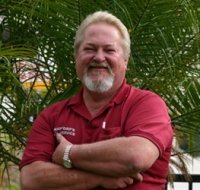Getting Zapped When I Plug In My RV
by George Maksim
(PA)
Question: When you plug in your RV should you disconnect your batteries? I have noticed that if I plug in my RV that if I go to take power wire to my one battery that supplies juice to my interior lights I get zapped also if both batteries are hooked up and its plugged in if you have damp hands you will get zapped on metal parts of RV like door and step.
I'm very new to stuff trying to figure out how to run water in it and stove and fridge. I have a 84 winn sunflyer itasca.
Also trying to figure out how to turn on all plug outlets.
Robbie: George, welcome to the world of RVs. When you plug in your RV you should always have your batteries connected so your converter can charge them. Only disconnect them when you have your RV stored.
The sparks when you touch the battery terminals are normal and are caused from something on like a light or an appliance. This will also happen if your batteries are low and your RV has been plugged in. It's kinda the same thing as hooking up jumper cables in a car.
If you're getting zapped touching the frame of the door, I suggest you have a tech look at your system and run a new ground to the frame of your RV. Also be sure the outlet source you're plugging into is grounded.
Lastly, if you're plugged in and the wall outlets are dead, you need to check your GFI to see if it has been tripped and your breakers to see if they are all good. Also be sure your microwave is blinking to be sure you even have 110V after you plug in the coach.
Because you're new to RV'ing I might suggest you have a tech come over and give you a general walk-thru and teach you the general systems in your unit. You'll enjoy the RV a lot more if you understand what your doing. Good luck and ask all the questions you need to. I'm here for you.
Comments for Getting Zapped When I Plug In My RV
|
||
|
||
Enjoy this page? Please help us pay it forward to others who would find it valuable by Liking, Sharing, Tweeting, Stumbling, and/or Voting below.
Have a question about this topic?
Have a question about your RV? Chat with an expert one-on-one now.*
*Chat provided by JustAnswer.com, a third party not affiliated with MSRVR
Like This Page? Share It!
Kind Words From Our Visitors

Hi, I'm Robbie. Welcome to Money-Saving-RV-Repair.com!
Like the name implies, this site is all about helping you save money while keeping your RV in tip-top shape--and that is all about you having the knowledge to do so.
I've been a technician in the RV industry for 30 years, operating out of San Diego, California. And let me tell you, I love my job.
But I also love empowering RVers with the knowledge they need to make the right decision on repairs, or to make the fix themselves--and that, my friend, is the reason for this website. I hope you enjoy.
Or, learn more about me, my RV service practice, & this website here.


